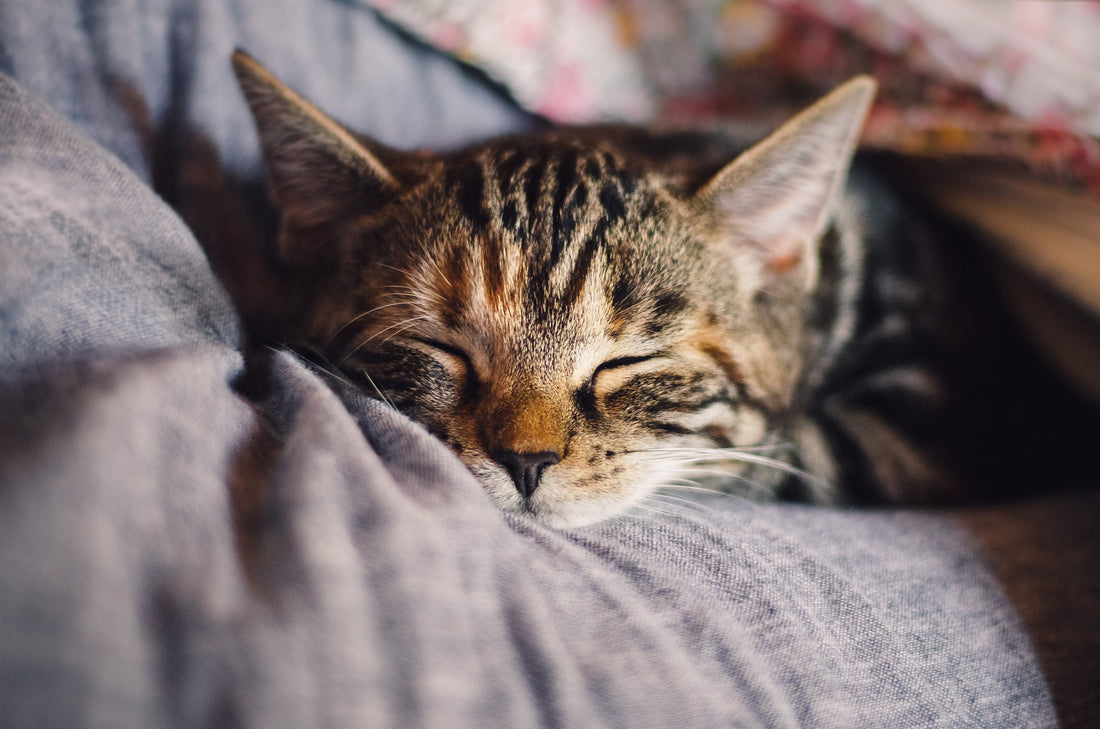Kidney disease is one of the most common health problems in older cats. In fact, 20-50% of cats over the age of 15 will have some form of kidney disease. For cat owners, especially those of us who have had cats most of our lives, we’re used to our senior feline friends having these sorts of issues. Yet while age is a major factor in whether or not a cat will develop some sort of kidney dysfunction, what most of us don’t realize until it’s too late is that genetics, infections, and diet also play their roles—which means cats of any age can potentially develop kidney dysfunction.
This is an important area of your cats health that you need to be aware of. Because if kidney issues are left untreated, and the underlying causes are not addressed, it can lead to serious health complications or even death for your cat.Obviously, we want to avoid that and enable our cats to live long, healthy, cuddly lives. So let’s take a few minutes to dive into the causes of kidney disease in cats, how to recognize if your cat has it, and how to make it as unlikely as possible to for your cat to develop kidney issues in the first place.
What is Chronic Kidney Disease in Cats?
Chronic kidney disease (CKD) is a progressive loss of kidney function that lasts for an extended period of time.
The kidneys' main job is to filter the blood and produce urine, so problems with the kidneys can lead to a variety of health issues in cats. Cats with CKD experience a buildup of waste products and other compounds in the bloodstream that are normally removed or regulated by the kidneys. This accumulation makes your cat feel ill and look tired, messy, and thin.

What Causes Chronic Kidney Disease in Cats?
Cats are susceptible to a variety of kidney diseases, which can be caused by a number of different factors. One of the most common causes is simply aging. As cats get older, their kidneys deteriorate and become less efficient at filtering out toxins from the body. Other causes of kidney disease include genetics, infection, and diet.
What Types of Diet Can Lead to CKD?
A poor diet is one of the most common preventable causes of kidney disease in cats. Cats who eat a lot of processed foods or foods high in sodium are at a higher risk of developing kidney disease. Feeding your cat a clean, healthy, balanced, and especially moist diet is one of the best ways to prevent this disease from developing. Moisture in your cat’s diet not only helps to keep them hydrated and generally means they’re getting better quality protein, but it's also usually tastier and easier to eat for senior cats who are more at risk for CKD.
Infection Can Cause CKD
Infection is another common cause of kidney disease in cats. Cats can develop infections in their urinary tract, which can spread to the kidneys and cause serious damage. This is actually a very common issue with middle-aged cats.
Feline Lower Urinary Tract Disease is what most of our customers are dealing with long before the kidneys become involved as the cat ages. This is the sediment, crystals, and associated inflammation that causes the common bladder infections or blockages that so many cats deal with from early middle age on. For many, chronic dehydration, poor diet, and subsequent inflammation and/or recurring infections associated with FLUTD eventually lead to CKD.
If your cat is displaying any signs of a urinary tract infection, it's important to take them to the vet right away.
Physical Damage Can Lead to Kidney Dysfunction
Damage to the kidneys themselves or any major trauma to the body can also lead to kidney disease. Rapidly losing too much blood, heat shock, and some cancers all have the potential to overwhelm the kidneys and eventually lead to disease. Cats who have been in car accidents, for example, or who have had major surgery are at a higher risk of developing this condition.
Genetics and CKD
Finally, genetics can also play a role in the development of kidney disease. Some cats are simply born with kidneys that are more prone to disease. There is no way to prevent this, but if you know your cat is at a higher risk, you can take steps to help them stay healthy (more on this later).
How to Recognize if Your Cat Has Chronic Kidney Disease
If you are concerned that your cat may have CKD, there are a few things to look for.
The clinical signals of kidney issues are not universal—different cats will show different symptoms. Usually, you can expect to see weight loss, a deterioration in coat health, stinky breath, unusual shifts in appetite, mouth ulcers, lethargy, and depression. Less commonly, you might notice increased drinking or urinating, vomiting, diarrhea, or anemia.
One of the most telltale signs of kidney disease is chronic dehydration—which is a cumulative and inevitable endpoint for most of the symptoms listed above. If your cat is not drinking enough water, is vomiting, and has diarrhea, all while their kidneys are struggling to process what water they manage to take in, dehydration is very likely. In addition, if your cat has acute kidney failure, they may start arching their back or walking stiffly—suggesting that their kidneys are causing them pain.
If your cat is displaying these signs, it's important to take them to the vet right away for a check-up.
Unfortunately, chronic kidney failure is a gradual process that could take years to build up and become noticeable. By the time you do see symptoms, the disease may already be leading to total kidney failure.
How to Avoid Kidney Disease in Cats
There are a few things you can do to help prevent kidney disease in your cat. The very best thing you can do to keep them as healthy as possible is to feed them a wholesome, balanced, moisture-rich diet full of quality animal protein. Seriously! It’s that simple.
There is No One Size Fits All Answer
We recognize that this might sound like a broad recommendation. That’s on purpose. There is no standard recommendation or dietary guidelines for CKD. Every cat’s nutritional needs are different, as well as their risk of CKD. Different nutritional needs require different diets which you would need to work closely with a qualified veterinarian to discover.
Low Phosphorus Diets for Feline Kidney Disease
For example, lowered phosphorus foods are a trendy recommendation for cats with kidney issues. However, they really shouldn’t be an across-the-board recommendation for CKD. Low phosphorus foods should be prescribed by a veterinarian only when a cat's blood phosphorus levels are elevated—usually in stage 3-4 CKD. However, in stage 1-2 CKD, most cats have normal blood phosphorus levels, and it's more important to ensure balanced phosphorus, magnesium, and calcium ratios to reduce sediment build-up.
Low Protein Diets for Feline Kidney Disease
Another common recommendation is to reduce the amount of protein your cat eats in order to reduce the amount of work their kidneys need to do. However, what we’ve seen in the research is that reducing protein has no value—and can even be detrimental to your cat's health—when not recommended by a vet for your specific cat. However, based on blood nitrogen levels, your vet may recommend reducing protein intake for a time.
The feline Veterinary specialist we worked with recently had very strong feelings about this specifically. Reducing protein like this is based on out-of-date information. As more studies are done on CKD in cats, we find that a focus on ensuring the quality of protein and reduction of carbs had more of an impact on improving cat health than a reduction in protein. Since weight loss is such a concern for CKD kitties our vet suggested focusing on palatability, mostly through moisture-rich (and often higher protein) canned or fresh foods, and only recommending specific nutrient adjustments like low phosphorus, low sodium, and lower protein when and if the blood work dictates.
In the end, this is the best way to prevent CKD in the first place! Just feed your cat the highest quality wet food you can.
What Else Can I Do to Protect my Cat’s Kidneys?
You can also help to keep your cat's kidneys healthy by increasing their water intake. This can be done by adding water to their food, increasing the amount of wet food they get compared to dry food, or offering them fresh water throughout the day. Cats are not very driven to drink standing water, so the most consistent way to increase moisture in their diet is to feed them more wet food.
Finally, it's important to keep an eye on your cat's weight for overall health. Being overweight puts much more strain on your cat's kidneys than being at a healthy weight, so keeping them at a healthy weight is crucial. This means ensuring that they are eating a high-quality diet full of healthy meats and free of fillers.
Wrapping up
Chronic kidney disease can be a devastating illness to work through for a beloved family pet. By being aware of the risk factors and symptoms, you can give your cat the best chance possible at a long and healthy life. That being said, keep in mind that chronic kidney disease is a common and potentially serious condition that can affect cats of all ages. It is caused by a variety of factors including age, genetics, infection, and diet, and can lead to a range of health issues.
It's important for cat owners to be aware of the potential signs of kidney disease and to take their cats to the vet if they notice any signs. Providing a healthy, balanced diet and promptly addressing any infections can help to prevent the development of kidney disease in cats, and there are various ways to manage the condition if it does occur. By understanding and addressing the needs of their feline friends, cat owners can help to ensure the best possible quality of life for their pets.

